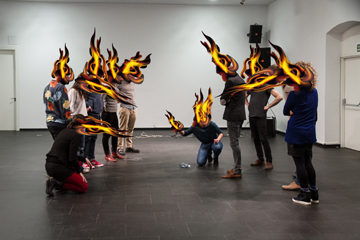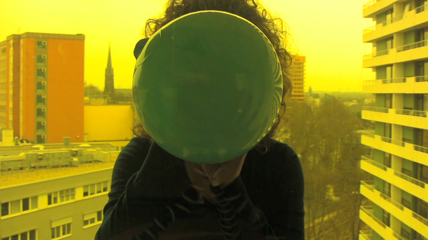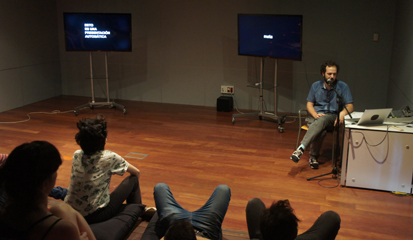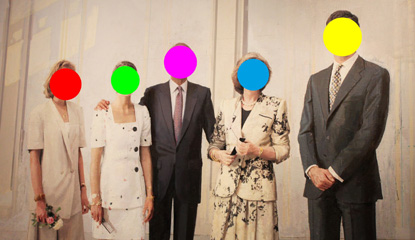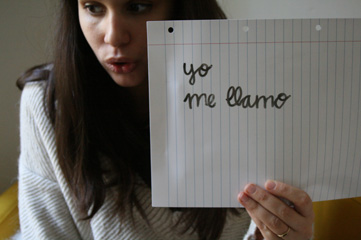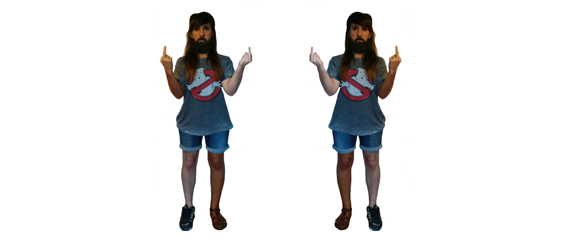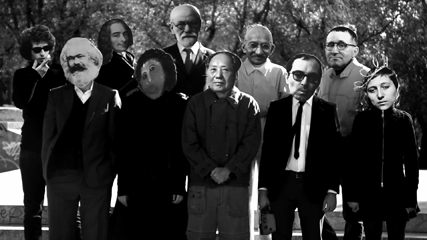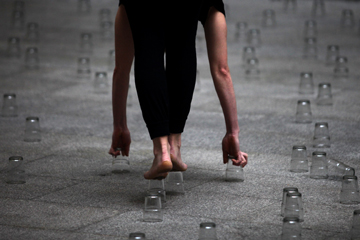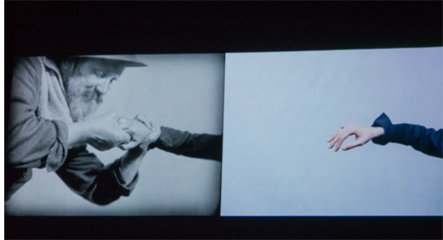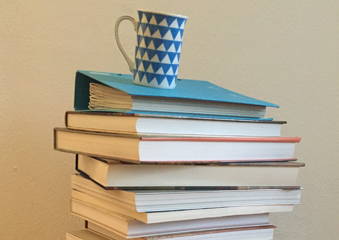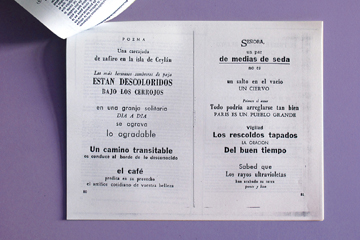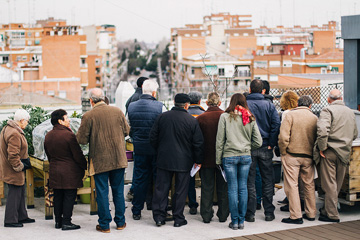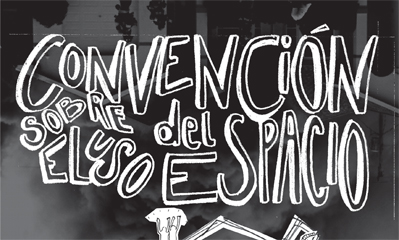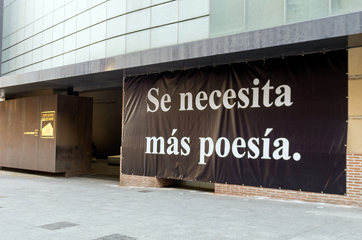The Convention on the Use of Space is a legal instrument drawn up in the Netherlands between March and May 2015 as a response to the housing crisis: the lack of affordable housing, the absence of provisions for the undocumented, rising rents, and the criminalization of squatting. The Convention considers space as a “good” that should not be privatised for profit or be left empty simply for speculative purposes and it lists the uses in which squatting should be protected, like providing free health services, sharing knowledge and skills, occupying space in protest, for housing purposes, running cooperative systems for wealth and labour distribution, providing mental and physical support, or the taking of space in order to protect it from environmental destruction.
In June and September 2016 we are organising a series of public meetings in various spaces in Móstoles and Madrid in which the Spanish chapter of the Convention will be prepared. Paying special attention to the historic genealogy of the issue of housing in Spain and the subsequent development of legislation, the meetings will feature keynote speakers and will encourage the public to take part in drafting this legislation from the perspective of different movements. A translated version of the Convention on the Use of Space will be read during the meetings, after which it will be discussed and modified in close collaboration with local groups of activists, legal experts, lawyers and the general public. The meetings will be open to the public and all those interested in issues related with the use of space. To receive more information on the Convention and on the times and venues of the meetings, join the mailing list on actividades.ca2m@madrid.org
Between April and May 2016, a number of meetings were held at Cuarto de Invitados to work on the convention and its translation. These meetings, which included a small group of participants, examined the ways in which the convention is expressed, the implications of the language used, and the issues involved in translating it. In addition, based on the material compiled during each meeting, there was a shared reflection on the various concerns raised by the document in question. The first meeting was held on 23 April at El Cuarto de Invitados (Calle Mesón de Paredes 42, 2ºA, Madrid) from 11:00 to 14:00 and from 16:00 to 18:00.
UPCOMING MEETINGS
WED 7 SEPT - ESKALERA KARAKOLA 19:00 - 22:00 (Calle de Embajadores, 52 Lavapiés, Madrid)
Article 12: If a space is occupied, how are the uses of that space decided?
In this session we will be taking a look at the Article dealing with issues of mediation and arbitration. If spaces are assigned in response to the principles agreed in the convention, how should they be assigned? How can disputes arising in these spaces be resolved?
The previous version of the convention underlined several questions and scenarios in relation with arbitration:
- If an empty space is occupied, how are the uses of this space decided?
- Are there uses in Spain that should be considered more important than others? Why?
- Are there successful experiences in assembly/collective decision-taking processes that can help to shape the structure for arbitration in relation to the convention?
- Or, should the convention be merely a document without rules for arbitration? If this were the case, how could conflicts be resolved?
- What are the possible effects of conflicts?
With the participation of:
Ana Méndez de Andés Aldama is an architect and city planner. She is currently an advisor to Madrid City Council’s Culture Department. As an architect and city planner she has worked on various landscape and urbanism projects in Amsterdam, London and Madrid and at different scales, ranging from general municipal plans to territorial strategies for the design of small urban public spaces. She has also taught city planning in Madrid and Shanghai, and has coordinated workshops and symposiums on issues such as urban commons, public spaces, strategic cartography and a radical democratic municipal project, at various universities and cultural institutes. She has taken part in research projects including Areaciega and Car-Tac, and is a member of the Observatorio Metropolitano in Madrid.
Lotta Tenhunen is an activist in the right to housing movement and a researcher.
Zuloark is an architectural infrastructure linked to the construction of open networks. Its goal is to respond to the necessity of evolving economic and entrepreneur models. Zuloark is a working platform defined as an area of proximity development, the interstitial space that exists between knowing how to do something and not knowing how to do it; it is the area where learning takes place, providing room for learning how to do something with help.
Jacobo García Fouz graduated with a degree in set design from RESAD in 2014 and produces new models and spaces for performance. He is one of the driving forces behind the community co-management project El Campo de Cebada, winner of many awards for the public space. He has created construction and design projects for stages for many theatre companies. He has also designed and built urban fixtures for different projects, collaborating with architecture and art collectives such as Zuloark.
THURS 15 SEPT - LA HIDRA 19:00 - 22:00 (Carrer de Sant Vicenç, 33 Sant Antoni, Barcelona)
Article 13: What kind of mutual support structures can guarantee the sustainability of networks?
The questions raised throughout the meeting have to do with the material maintenance of spaces, with caretaking and the possibility of generating support networks among signers of the convention. In this regard, how can we create a support network that will help to maintain housing/buildings, and how can we proportion mutual support for temporary housing? Buildings get run down if their users do not look after their maintenance, and in the majority of cases occupiers prolong the life of buildings. And while these repair and maintenance operations are normally carried out by the occupiers of the buildings, this excludes the possibility of these spaces housing people with different capacities, given the impossibility of carrying out repairs independently, and is this a problem?
Some of the questions raised:
- If the convention operates outside normative channels of external funding (bank, state or subventions), then how can the members avail of a safety net of some kind?
- What practices of sustainability/maintenance should be specified in the Convention?
- How should the mutual support be managed, what are the parameters for this support and how are they decided?
Rubén Martínez specializes in the relationship between social innovation practices, public policies and new community economies.Between 2002 and 2011 he was founder and co-director of YProductions, a company focused on the political economy of culture. He is co-author of books such as Producta50: una introducción a las relaciones entre economía y cultura (CASM, 2008), Innovación en cultura: una genealogía crítica de los usos del concepto (Traficantes de Sueños, 2009), Cultura Libre (Icaria, 2012) and Jóvenes, Internet y política (CRS, 2013). He has given papers at international symposiums and congresses on public politics and community management including Latin America Commons Deep Dive (Mexico City, 2012) and in European research groups like P2P Value and TRANSGOB. He is currently finalising his doctoral thesis on politics of social innovation at Instituto de Gobierno y Políticas Públicas (IGOP). He is also a member of Observatorio Metropolitano in Barcelona.
Manuela Zechner is a cultural activist and founder of the Future Archive project. She has a PhD in Precarity and Networks of Care in the European Crisis, from Queen Mary University of London; an MA in Visual Cultures from Goldsmiths University London, with a thesis on Subjectivity and Collectivity in Foucault and Simondon; and a BA in Fine Art Media from Chelsea College of Art. She works across relational methods (Theatre of the Oppressed, Somatics, Choreography, Writing), research methods (mapping, performative interview, co-research, militant research) and audiovisual production (radio, video). Her main projects are Future Archive (2005- ), Radical Collective Care Practices (2012- ) and the radio show The Sounds of Movement (2012- ) and Vocabulaboratories (2007-2009). She is active in various collectives, including the Nanopolitics group (2010- ), the Centre for Ethics and Politics (2011- ), the Kamion jounral (2014- ) and la Electrodoméstica (2014/15)
SAT 17 SEPT - CA2M, 11:00 - 18:00
GENERAL REVISION: A day for debating and editing the final draft of the document.
PROGRAMME OF PREVIOUS MEETINGS
7 JUN. PRIMER ENCUENTRO. CA2M
LA FORMA LEGAL
PREÁMBULO Y ARTÍCULO 1
En esta sesión se discutió acerca de la forma de la convención: ¿qué es una convención? ¿Cómo opera como documento? Además revisamos el preámbulo de la convención, sus fundamentos: ¿qué es lo que apoya esta convención? ¿Cuáles son sus principios?
Durante esta reunión además nos centramos en el artículo primero de la convención: «Las partes de la convención». ¿Para quién es esta convención? Poniendo en relación con precedentes para este tipo de documentos como la carta de las Okupas británicas y qué es lo que se entiende por una legislación «desde abajo».
Contó con la presencia de:
Emilio Santiago Muíño. Doctor en Antropología Social. Miembro del Grupo de investigación transdisciplinar sobre transiciones socioecológicas. Fundador y activista del Instituto de Transición Rompe el Círculo. Autor de No es una estafa, es una crisis (de civilización) y Rutas sin Mapa (premio ensayo Catarata 2015).
Somateca es el nombre que agrupa a un conjunto de personas que están trabajando en torno a las prácticas crip-queer (taradas cuir) en Madrid. Desde su investigación abordan asuntos como la diversidad funcional y sexual, el cuerpo, la normatividad, los feminismos, los afectos o los deseos son algunos de los temas que vertebran el trabajo de esta constelación de personas y sobre los que investigan en diferentes proyectos que toman la forma de reflexión teórica, creación artística o acción performativa entre otras. El grupo Somateca surgió como resultado del programa de Estudios Avanzados en Prácticas críticas del Museo Reina Sofía, dirigido por Paul B. Preciado.
Eduardo Gómez Cuadrado. Licenciado en Derecho por la Universidad de Valladolid, con un Máster en Práctica Jurídica por la Universidad de Salamanca. Socio fundador de Red Jurídica Cooperativa. Abogado especializado en Derecho Penal. Trabajo en el Turno de Oficio Penal, Menores y Audiencia Nacional y en elServicio de Orientación Jurídica General del Colegio de Abogados de Madrid. Miembro de la Asociación Libre de Abogadas y Abogados (ALA), en la Comisión Defensa de la Defensa.
14 JUN. SEGUNDO ENCUENTRO. ROMPE EL CÍRCULO.
EL DERECHO A LA CIUDAD
ARTÍCULO 4
Esta sesión estuvo orientada hacia el «derecho a la ciudad» y la cuestión de la crisis de las hipotecas. ¿Cómo sería un derecho a la vivienda/ a la ciudad en España? Reescribiendo el artículo de la convención esta reunión se centró en la criminalización de las prácticas especuladoras relacionadas con la vivienda. Por ejemplo ¿cuál ha sido el impacto del Estatuto de la ciudad que ha establecido en Brasil el derecho a la ciudad? ¿Cómo podría ser una ciudad libre de una legislación hipotecaria represiva?
Contó con la presencia de:
Alberto Astudillo García, reportero gráfico especializado en fotografía social, participa también en la creación del documental La Cañada Real; Otra mirada (2012). Licenciado en Ciencia Política por la Universidad Complutense de Madrid, completa su formación académica con estudios de Antropología en la misma Universidad. Miembro activista en el sector de la vivienda desde 2007, en la actualidad es concejal del grupo en la oposición Ganar Móstoles.
Eva Álvarez de Andrés, cuya trayectoria ha estado orientada hacia el objetivo de hacer efectivo el derecho a la vivienda y a la ciudad para todas las personas. Inicia Arquitectura y Urbanismo en 1989, fue socia fundadora de la ONG Ingeniería Sin Fronteras en 1991 y trabajó en el Instituto de Estudios Políticos para América Latina y África (IEPALA) al terminar la carrera. Movida por el deseo de conocer in-situ la realidad de quienes ven sistemáticamente vulnerado su derecho a la vivienda y a la ciudad en los países más pobres residió República del Benin entre 1999 y 2003, tras lo cual volvió a España para iniciar estudios de doctorado en el Departamento de Urbanística y Ordenación del Territorio (DUyOT–ETSAM–UPM), con el objetivo de profundizar en las causas de la exclusión habitacional y estudiar posibles alternativas. Desde finales de 2013 y hasta la actualidad ocupa una plaza de personal laboral en la Universidad Rey Juan Carlos. A lo largo de toda la etapa investigadora (desde 2003) he realizado varias publicaciones, todas en la línea del derecho a la vivienda y a la ciudad; desde 2010 hasta 2014 ha sido coordinadora de la Red Internacional de Estudios Urbanos sobre Ciudades del Sur (N-AERUS), y miembro del Grupo de Investigación Arquitectura, Urbanismo y Sostenibilidad (GIAU+S).
21 JUN. TERCER ENCUENTRO. TRAFICANTES DE SUEÑOS.
¿QUIÉN DECIDE LOS COMUNES?
ARTÍCULO 3
¿Quién define los procomunes? ¿Cómo se definen los bienes comunes? En este encuentro se abordó uno de los aspectos fundamentales de la convención: el valor de uso del espacio. Si pensamos en una ciudad libre de la especulación de la propiedad privada y abierta a las posibilidades de la toma colectiva de espacios ¿cómo podemos hacer estas demandas evidentes? ¿Qué sucedería si el espacio tuviese valor no tanto por su capacidad de generar beneficio como por su uso? ¿Qué sucedería si su uso fuese protegido?
Contó con la presencia de:
Miguel A. Martínez es profesor de sociología y ha participado en varios movimiento sociales. Sus publicaciones se han centrado, sobre todo, en temas urbanos y en el movimiento de okupaciones, tanto en España como en Europa. Es miembro de la red de investigación-activista SqEK (Squatting Europe Kollective).
Alejandra de Diego de Qiteria, entidad cooperativa que se rige bajo los principios de la economía social, formada por un equipo interdisciplinar de profesionales de las ciencias sociales, con amplia experiencia en investigación cualitativa y cuantitativa e intervención social, incluyendo el ciclo completo del proyecto: ideación, diseño, implementación y evaluación. Alejandra de Diego es licenciada en Antropología Social y Cultural por la Universidad Autónoma de Madrid con especialidad en análisis y diseño social urbano así como en el diseño y desarrollo de procesos participativos. Con experiencia en investigación e intervención social. Es socia fundadora y ha formado parte de la cooperativa de investigación social aplicada QITERIA donde ha participado en numerosos proyectos diseñando, desarrollando y evaluando procesos de investigación e intervención social en diversas áreas: migraciones (MENARA), prácticas cooperativas ciudadanas (COOPERLAND), alfabetización digital (PADIMM), diseño social urbano (DREAMHAMAR). Actualmente está en Medialab-Prado como coordinadora de Inteligencia Colectiva en el Laboratorio de Innovación Ciudadana investigando sobre herramientas digitales para la democracia y su aplicación en el territorio.
29 JUN. CUARTO ENCUENTRO. SOLAR ANTONIO GRILO
CRIMINALIZACIÓN DEL USO DEL ESPACIO
ARTÍCULO 2
¿Quién ha sido criminalizado y cómo ha sido afectado el uso de espacio privado/público después del 15M? A través del análisis de la ley Mordaza, sus precedentes y consecuencias reformulamos el artículo 2 de la Convención sobre el uso del espacio.
Contó con la presencia de:
Juan Carlos Mohr. Formado en Bellas Artes, en los últimos años viene desarrollando un trabajo dentro del activismo de la imagen que lo ha situado en el centro de los principales acontecimientos de los últimos años: del 15M y el movimiento de ocupación de las plazas, al movimiento antidesahucios o a la crisis de los refugiados en Lesbos y Hungría. Lejos de trabajar dentro de la lógica del fotoperiodismo ortodoxo, las imágenes de Juan Carlos Mohr dirigen una mirada políticamente situada sobre los acontecimientos, poniendo su objetivo en los lugares que habitualmente quedan invisibles para los medios hegemónicos. Para Juan Carlos Mohr además las imágenes son bienes comunes, por ello están a disposición de quien quiera usarlas bajo licencias creative commons. Twitter, Facebook y las redes sociales son espacios de expresión y difusión de su pensamiento y trabajo.
La Plataforma ‘No Somos Delito’, formada por más de 100 organizaciones de activistas, juristas, y ciudadanía, nace con el ánimo de informar acerca del significado de la Reforma del Código Penal y Ley de Seguridad Ciudadana. Somos una plataforma apartidista y realizamos presión institucional para que estas reformas no se aprueben, a través de todos los caminos democráticos habilitados para ello.
«Somos vecinos y vecinas. Somos ciudadanos que sueñan con una sociedad más solidaria, empática, consciente, activa y fuerte. Somos un grupo de personas unidas en contra de la reforma del Código Penal, la Ley de Seguridad Ciudadana y la Ley de Seguridad Privada».
No Somos Delito lleva más de un año denunciando la gravedad de estas reformas con las cuales se construye una justica para ricos y otra para pobres.
Más información en actividades.ca2m@madrid.org
Este proyecto fue desarrollado en conjunto con Beirut, en El Cairo y Casco, Oficina de Arte, Diseño y Teoría de Utrecht. La segunda fase del proyecto se realizá en el CA2M.
